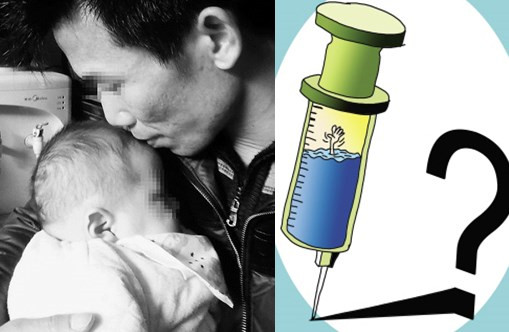Gov't suspends China's 3 major Hep. B vaccine makers

 0 Comment(s)
0 Comment(s) Print
Print E-mail CNTV, January 8, 2014
E-mail CNTV, January 8, 2014
China’s three major hepatitis B vaccine makers have been ordered to suspend production. The country’s Food and Drug Administration made the announcement after the companies failed to get certified under the new Pharmaceutical Products standard. The move is a sign of the government’s toughening resolve to deal with drug safety in the country.
Coming down hard on medicine makers.
China’s Food and Drug Administration halted hepatitis B vaccine production by the country’s big three manufacturers: Beijing Tiantan Biological Products, BioKangtai, and Dalian Hissen Bio-Pharm.
They had had until the end of 2013 to meet the country’s updated manufacturing practices set out by the Pharmaceutical Products standard. And when they failed to meet the deadline, the government took action.
“We will not allow any products that do not meet the standard to pass examinations. We will organize certification examinations in a timely manner for all products that meet the standard.” Li Guoqing, senior official of China Food & Drug Administration, said.
Hepatitis B is a potentially life-threatening liver infection. And the three companies produce 80 percent of the vaccines to deal with the infection in China.
The government said vaccine supplies are still sufficient to meet market demand despite the production suspension.
And vaccines produced before the deadline meet standard and so are still permitted to be sold. There are seven companies in all that offer vaccines against the disease in China. But only two have passed the new certification standard.
Beijing Tiantan said in a statement that the company will resume production once new facilities that comply with government standards are open.
BioKongtai said it is now assisting investigators, while Dalian Hissen hasn’t released any statement so far.
This follows recent incidents in which 17 newborn babies died after being inoculated against hepatitis B virus. Authorities last week ruled that the vaccines were NOT the cause of the deaths. But concerns remain among the public over drug safety.
“Children are innocent. I feel sorry for them. The government must be tough on drug safety issues.”
“I am going to deliver a baby soon, so the incident has made me concerned. The government should strengthen monitoring on drug producers.”
“We still have to use vaccines no matter what, so it’s important that the government can ensure drug safety.”
Hu Yinglian, a sociology expert from the Chinese Academy of Governance, believes that better public awareness must also be a part of the government’s supervision campaign.
“A strong reaction from the public is understandable. But people need to have a scientific understanding of vaccines. So the supervisory departments need to guide the media and organize ways for drug manufacturers and scientists to communicate with the public so that people will be able to know how vaccines work and if they are safe to use.” Hu said.
Hu adds that the inoculation rate has dropped by 30 percent since the newborn deaths were first reported. That means the infection rate of hepatitis B could increase dramatically in two years. That could affect domestic vaccine manufacturers.
“To restore public confidence, first of all, we must modify the drug production system, and improve the industrial quality so that drug manufacturers place product quality as their top priority. Second, we need to strengthen monitoring and be able to evaluate and manage possible risks caused by drug products. Thirdly, there should be more cooperation between medical institutions and supervisory departments.” Hu said.
Reporter: “The three companies may resume production after getting certification, but public confidence in China’s health authorities and the country’s drug safety regime has been hurt. Experts say the production suspension by the government is meant to send a strong signal to drug makers, in hopes of restoring public confidence. An all-around monitoring system from manufacturing to responding to emergencies is needed."





